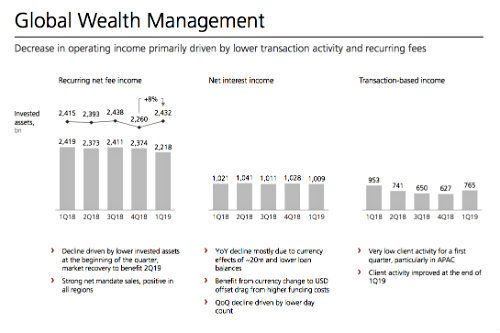Superpowers Elude UBS Wealth Megadivision
One year into a megamerger of UBS' heavyweight private bank and U.S. brokerage, why hasn't the new super-unit fulfilled expectations? The finews.asia check-up.
«The largest and only truly global wealth manager», UBS said last year when it tied up the former Paine Webber brokerage it runs in the U.S. with its wider, international private bank. The merger came seven years after CEO Sergio Ermotti centered UBS’ strategy around private banking, following a $2 billion rogue trading loss in 2011.
«It will mean improved efficiency, more sharing of best practices, greater returns on our investments and enhanced client service», Ermotti said when disclosing the move. On Thursday, the Swiss bank said the flagship unit’s profit tumbled 22 percent on the year to $863 million. Ermotti’s wish to become more efficient simply hasn’t happened: with a cost-income ratio of 78.4 percent, UBS’ private bank is 330 basis points clunkier than one year ago.
Asia's Rich Demur
What happened? Co-heads Martin Blessing, who used to run Commerzbank but isn’t a traditional wealth manager, and Tom Naratil, an UBS lifer, haven’t had the best timing. Revenue from transactions slid nearly 20 percent – much of the quarter was marred when traditionally trading-friendly Asian clients sat out most of the quarter (see graph below).
This led the wealth arm’s overall revenue down, as did a fall in recurring fees because assets were down. In short, any advantages of joining up – which finews.asia questioned last August – is masked by abysmal conditions for wealth managers in general. The $2.26 trillion asset supertanker – the world's largest private bank – can't do much without water under the keel.
An accounting quirk in the U.S. complicates matters: the Swiss bank hews to a month-to-month booking strategy against the last quarter's end day for the U.S. Because the Americas is the larger chunk in assets, revenue, and profit for the private bank, this seemingly minor technicality means improvements like the quarter-end don't trickle through until one quarter later.
Bright Spots Emerge
UBS' helplessness is evident in a dry outlook for the wealth and asset management arms: «Further momentum would require a sustained improvement in market activity and client sentiment across our businesses.»
High-Profile Exits
The key question is now how co-heads Blessing and Naratil respond: more cost-cutting than CEO Ermotti disclosed last March? Major spending cuts could paralyze the mega-unit at a time when it is still uniting two very disparate cultures, as finews.com described last year.
The unit's stalling comes amid a flurry of speculation over UBS' asset management unit, with which the private bank is closely entwined. Ermotti has also fended off unwelcome attention to his own succession, amid reports that once-cozy ties between the CEO and Chairman Axel Weber have cooled, as finews.asia reported. And most recently, the super-unit has suffered management jostling and several high-profile exits including that of chief lawyer Maria Leistner.
Reporting by Samuel Gerber and Katharina Bart



























